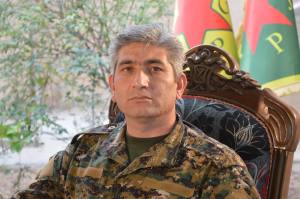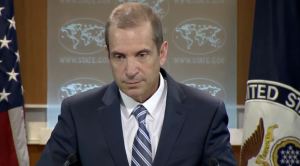nsnbc : The United States and Russia expressed concerns about Turkey’s airstrikes against Kurds in Syria after some 20 members of the Kurdish People’s Protection Units (YPG) were killed on Tuesday. Turkey considers the Democratic Union Party (PYD) and its military wings the YPG and YPJ as terrorist organizations allied and on par with Turkey’s Kurdistan Worker’s Party (PKK).
The YPG issued a press release stating that at 2 a.m. on Tuesday 25, 2017, Turkish airplanes launched a large-scale attack on the headquarters of the General Command of the People’s Defense Units (YPG) in Mount Karachok near the city of Derik. On Tuesday, the Turkish army hit 39 positions of the YPG and the PKK in Syria and Iraq. The official spokesman of the Syrian Kurdish People’s Protection Units, Redur Xelil, said that 20 of their fighters were killed and 18 injured by the Turkish airstrikes.
The YPG stressed that there also are a media center, a local radio station, communication headquarters and some military institutions at the location. The YPG denounces the air raid as “a treacherous attack” that has “led to the death and wounding of a number of our comrades”. In its press release the YPG also asserted:
“We as the People’s Defense Units say that this cowardly attack will not discourage our determination and our free will to fight and confront terrorism. We also call on our people with all its components in Rojava to stand in line with its legitimate forces in the face of this blatant attack”.
Mark C. Toner, the deputy spokesperson of the US State Department commented on the incident saying:
“The point we made to Turkey and I’m making now is that Turkey cannot pursue that fight at the expense of our common fight against the terrorists that threaten us all, and that obviously means ISIS. … So we’ve conveyed this to Turkey. This is part of our ongoing dialogue with them. Again, we recognize their concerns about the PKK, but these kinds of actions, frankly, harm the coalition’s efforts to go after ISIS and, frankly, harm our partners on the ground, who are conducting that fight. … This is an effort that we’ve been making with Turkey both to address their concerns – and I recognize that there are concerns about PKK, legitimate concerns about the PKK – but also to coordinate on the ground. .. Everyone in this fight is there to defeat ISIS. Everyone recognizes that it’s a very complex battlespace. There are different groups, different ethnic groups. That includes Kurds. It also includes Syrian Arabs, Syrian Turkmen, other ethnicities who are, we believe, strong partners in the fight to defeat ISIS. … We’re going to continue partnering with these groups, and I think the effort going forward is going to be to make clear to Turkey that it’s in their interests, it’s in all of our interests, to focus on defeating ISIS.”
Part of Toner’s statement referred to the primarily YPG-led Syrian Democratic Forces. The situation of the PYD / YPG-YPJ is complex. It cooperates with both Syrian military forces and their allies, and indirectly with the United States and the U.S. coalition against ISIS (ISIL / Daesh) via the YPG’s leading role within the Syrian Democratic Forces (SDF).
Turkey attempts to counter increased PYD / YPG – YPJ and other Kurdish influence along its southwestern border with Syria by its continued support for so-called “moderate” and also “not-so-moderate rebels” including Turkmen insurgents, as well as insurgent groups with more or less direct links to the nexus of Al-Qaeda linked groups in the region.
Turkey opposes “any” Kurdish presence that could challenge its regional hegemony west of the Euphrates river while Turkey cooperates with the KDP – PUK administration in the Kurdistan Autonomous Region (KAR) in northern Iraq.
Mark Toner added that the United States has also been clear to some of these groups as they liberate territory that there needs to be a return to local governance. He added:
“That the local groups or the local ethnicities who were driven out from these towns and cities be able to return and feel safe in returning. And so this is a conversation we’re having with all of the actors on the battlefield. It’s complex, it’s difficult, but it’s something we’re working at … One is it’s important to note that the composition of the Syrian Democratic Forces, which is this conglomeration of different groups fighting on the ground, that force currently operating to isolate Raqqa is, I think, approximately 75 percent Syrian Arab and is fairly consistent demographically with what you’d find in that area. … And that’s what I was – the point I was trying to make earlier, that a fundamental guiding principle of this campaign is for the force used to liberate an area, that that force be consistent with what you’d find locally in that area. So for Raqqa, that includes Syrian Arabs, Kurds, Turkmen, Christians, and others. …. And so the Syrian Democratic Forces are, by their very nature, a multiethnic and multisectarian organization, and that’s, frankly, one of the reasons why we’re working with them. The other reason is that they’re very effective and very brave and courageous in going after ISIS. So – and as I said, operations – as operations continue, locals are returning to establish control and governance in their home areas while local Arab fighters continue to join the SDF’s or the Syrian Democratic Force’s ranks. … So we’re going to continue to work with Turkey to de-conflict and address their concerns about these forces, but it’s our assessment that these forces reflect the multiethnic character of those areas.”
Turkey’s airstrikes in Syria were also condemned by the Syrian government and reiterated that Turkey’s military activities in Syria are illegal and violate Syrian sovereignty as well as international law. Damascus also underpinned that the fact that Turkey targets the YP rather than ISIS is revealing Ankara’s intentions. The government in Ankara justified the airstrikes in Iraq and Syria as “anti terrorism operations”, while Turkey continues its support of Islamist insurgent groups in northern Syria, including groups with overt or covert links to the Al-Qaeda nexus.
Russian Foreign Minister Sergei Lavrov also condemned Turkey’s airstrikes against the YPG, and very much for similar reasons as those expressed by U.S. State Department spokesman Mark C. Toner. Russian – U.S. cooperation on Syria is in many regards better than many may be led to believe. The Russian and US forces are maintaining direct working contacts, despite the suspension of the bilateral memorandum on safe flights over Syria, said the Head of the Main Operations Department at Russia’s General Staff Sergei Rudskoi on Wednesday.
CH/L – nsnbc 27.04.2017
Source Article from https://nsnbc.me/2017/04/27/us-russia-concerned-about-turkeys-airstrikes-against-kurds-in-syria/
 RSS Feed
RSS Feed















 April 27th, 2017
April 27th, 2017  Awake Goy
Awake Goy 












 Posted in
Posted in  Tags:
Tags: 













